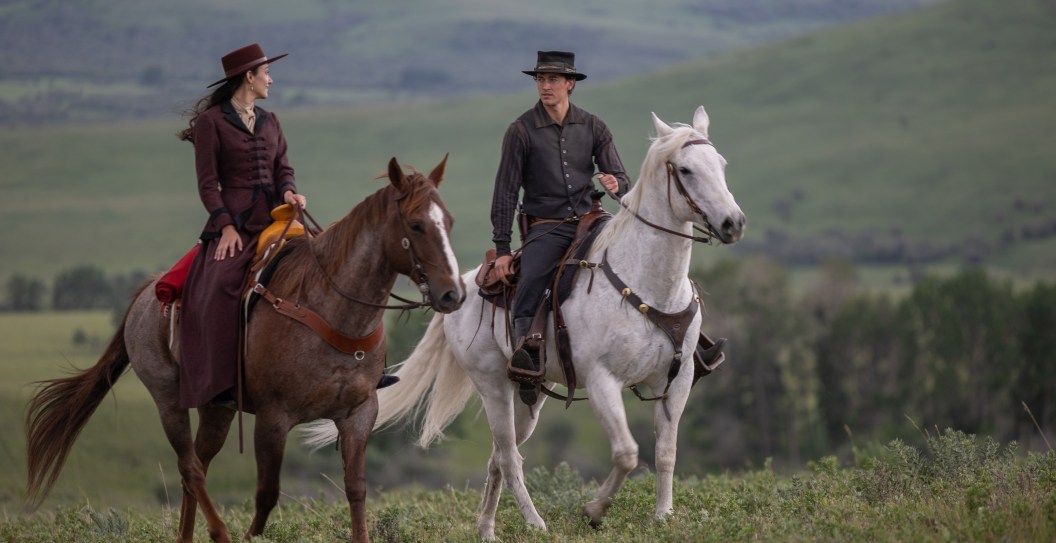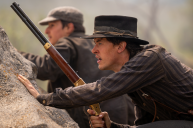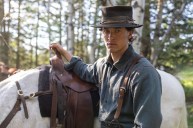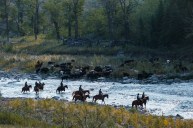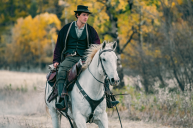"Billy said he was always more sinned against than sinning. I think, on balance, it's true." That's what "Billy the Kid" creator Michael Hirst says of his childhood hero. And he would know: Hirst did an astonishing amount of research to de-mythologize Billy the Kid, America's most famous Old West outlaw, in the MGM+ series that bears his name. While Season 1 tracked Billy's immigrant upbringing, Season 2, which premieres Oct. 15, will fire the first shots of the Lincoln County War in which Billy's legend was cemented.
For a figure who's captivated Western film audiences for decades, a TV show focused solely on Billy's rise (and fall) is refreshing — especially one that's fairly age-accurate. Series star Tom Blyth, who fronts the upcoming "Hunger Games" prequel, brings a youthful idealism and sweetness to the outlaw who purportedly died at age 21. Australian actor Daniel Webber returns as Billy's friend, foe and foil Jesse Evans — another gunslinger from legend. This season, the bosom buddies face off in rival factions of the bloody range wars that racked Lincoln County, New Mexico at the end of the 19th century.
Wide Open Country sat down with Hirst and Executive Producer Donald De Line to talk all things "Billy the Kid" Season 2. Hirst is the sole creator and writer of "Billy the Kid," as well as an executive producer on the series. Perhaps best known as the creator of "Vikings," the British scribe specializes in character studies of historical figures. He also created the TV series "The Tudors" and "Camelot," and he received a Best Original Screenplay BAFTA nomination for the 1999 biopic "Elizabeth," starring Cate Blanchett. For his part, Donald De Line is a longtime producer, with films like "Ready Player One," "Fool's Gold" and "The Italian Job" under his belt.
The pair discussed their vision for the series as a whole, Billy and Jesse's not-quite-broken relationship in Season 2 and why they think the real-life Billy wasn't necessarily destined for outlaw fame.
Warning: Mild spoilers ahead for "Billy the Kid" Season 1.
Loving Billy the Kid
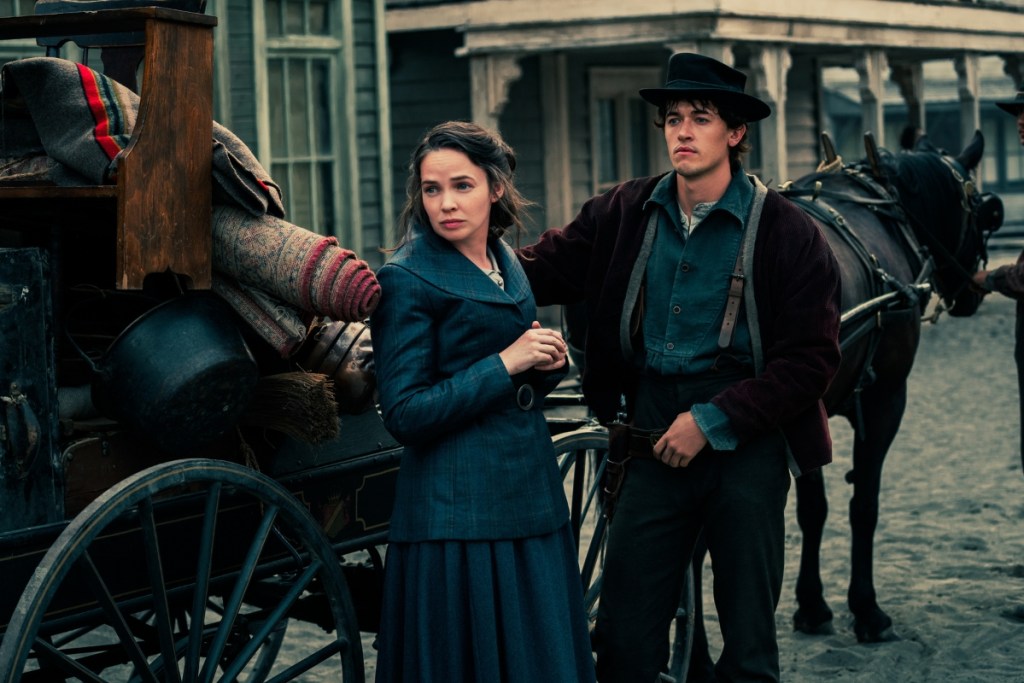
Eileen O'Higgins and Tim Blyth in "Billy the Kid" Season 1. (MGM+)
Michael Hirst set out to deconstruct the myth of Billy the Kid — the preternaturally talented gunslinger who killed 21 men in about as many years of life. And he doesn't deny that his was always going to be a sympathetic telling of Billy's life. "From my point-of-view, it's a love story because I've loved Billy since I was a boy."
In his research, he stumbled on the untold story of Billy's close bond with his mother, referred to as Catherine in historical accounts. In the series, her name is Kathleen McCarty and she's played by Irish actress Eileen O'Higgins ("Brooklyn"). Widowed young, Kathleen remarries the alcoholic Henry Antrim. She's a devout Catholic, doing unto others as she would have them do unto her — even when said others are up to no good. Dramatizing her impact on a young Billy seemed like a no-brainer.
"He had been very influenced by her — by her faith, by the stories she told him. She told him a lot of Irish myths. She sacrificed, essentially, a lot to bring him and his brother up," Hirst says, adding, "As I was writing, it gave me a deeper sense of his love for her and his understanding, actually, of how hard it was for her when they came West. For a young woman in that time, going West was like a primitive land."
That primitive land takes Billy's father and brother. But it's Kathleen's illness and death in Season 1 that marks the real start of his journey into outlawry. She was Billy's moral compass, and her memory reverberates throughout Season 2.
The Season 2 Focus on Billy and Jesse
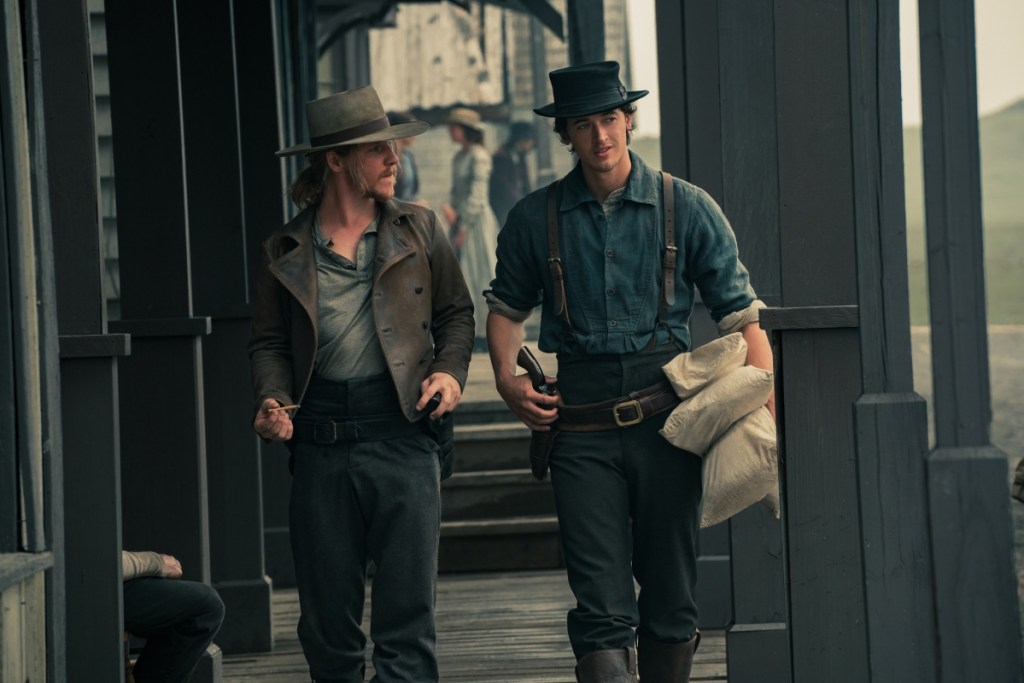
Daniel Webber and Tom Blyth in "Billy the Kid" Season 1. (MGM+)
You can track the evolution of Billy's character by looking at his relationship with lifelong outlaw Jesse Evans at any given moment: Is he trying to join him, convert him or defeat him? Both legendary gunslingers, Billy and Jesse were friends in real life who found themselves on opposite sides of the Lincoln County War, the central conflict of Season 2.
"Billy takes turns away from the road that Jesse's on. Jesse's always going to be an outlaw. That's his nature," says Hirst. "Billy's nature is evolving. Each time they get together, you never really know how it's going to work out."
The jury is still out on whether Jesse's penchant for extreme violence inspires the same in Billy or gives Billy license to go even further in the direction of something like goodness. But, certainly, Billy had a much different view of the frontier than Jesse did. As Executive Producer Donald De Line puts it, Billy was a modern thinker.
"He did not like the inequities he was seeing," says De Line, referring to Billy's knee-jerk reaction against misogyny and predatory business practices throughout the series. Billy disavowed hate crimes perpetrated against Mexican immigrants, and the historical record supports this. "He began to kind of stand for something, whereas Jesse was pretty much trying to survive in a very rough world and wanted to take whatever he could get for himself. Billy kind of outgrows that impulse."
In breaking down the way Billy and Jesse dance around each other, Hirst quotes author Henry James' character theory, which specifies two types of characters. There are so-called fixed constituents, whose personalities and behaviors you can predict as soon as they appear onscreen. Then there are free agents — free spirits like the heroine Isabel Archer in James' 1881 novel "The Portrait of a Lady." She's a penniless American whose liberal sensibilities are squashed when she enters the British aristocracy. It may seem like an odd comparison, but you can see how Isabel's famously deep introspection is the kind of character study Hirst perhaps wanted to paint for Billy the Kid.
"You don't know what [Isabel Archer] is going to do partly because she doesn't know what she's going to do. It's really the same with Billy and Jesse, I think. You're not quite sure what they're going to do. And they find it terribly difficult to kill each other [Laughs]."
Billy's Alternate Fate
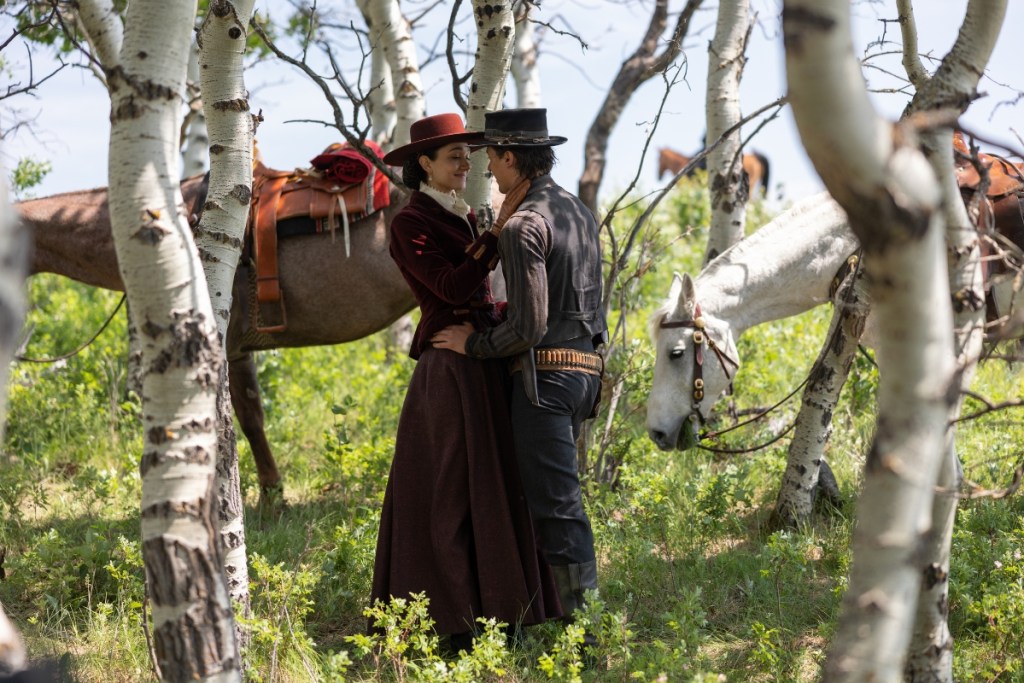
Nuria Vega and Tom Blyth in "Billy the Kid" Season 2. (MGM+)
This Billy, as portrayed by Tom Blyth (whom De Line calls "such a smart young actor"), looks like a romantic hero. And the aesthetic isn't far from the truth — right down to his curious bohemian costuming.
"That was Billy," says De Line. "The iconic look that he had, which was that kind of red jacket that was almost part sweater, part jacket. He dressed in a very eccentric, unique way. That was there, and Michael mined that."
It's no surprise that a Billy the Kid story like this should be ripe for 2023. His traumas—a displaced immigrant family, being orphaned at 15—awakened his mind to larger issues about society and the law. In Season 1, he openly questioned the veracity of the American Dream. But Hirst and De Line didn't set out to modernize Billy, per say.
"It wasn't like I came up with the idea that Billy was going to be a contemporary character," says Hirst. "The fact that he was the son of immigrants that had not been treated well was of our time. His sense of social injustice was also of our time."
So how did he become the Billy the Kid we know? Was it personal tragedy or the pressure cooker of the frontier that turned him into a criminal? Probably a bit of both. Says De Line: "I think Billy would have ended up in somewhat different circumstances had his mother survived."
"He was a very sensitive soul, Billy," says Hirst, adding: "The thing that he really wanted to do was to go straight and lead a fairly normal life. He's being pulled back into the life of an outlaw."
"Billy the Kid" Season 2, Part 1 premieres the first of four episodes Oct. 15 on MGM+. Part 2 will drop on the streamer in 2024.
